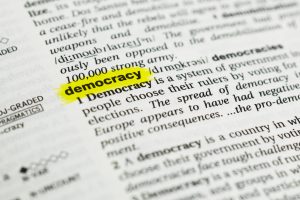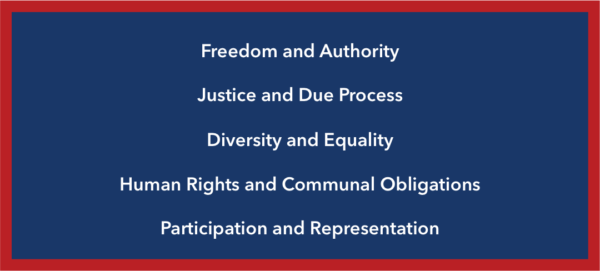Polarities + Democracy
 The Institute for the Polarities of Democracy believes that democracy is the solution to oppression.
The Institute for the Polarities of Democracy believes that democracy is the solution to oppression.
Incorporating Polarity Thinking as its conceptual framework, the Polarities of Democracy theory can be used to plan, guide, and evaluate social change efforts to address the social and environmental threats to our human survival and support building healthy, sustainable, and just communities. The theory includes ten overarching democratic values required to fully attain democracy and posits that each of these values are essential, yet none are sufficient alone. The ten values are arranged in five interrelated polarity pairs.
The theory’s ten nonpartisan values, in their five polarity pairs are:

The Polarities of Democracy theory successfully integrates the Polarity Thinking, civic education, and organizational development, as well as the concepts from Western, Eastern, African, and Indigenous wisdom, providing a theoretical framework for the democratization of workplaces and society in order to address the social and environmental challenges faced on a local, national, and global level. The Polarities of Democracy theory promotes participatory practices that allow citizens, workers, families, organizations, and communities to unleash their creativity and strengthen their capacity for both research and social change initiatives that promote social and environmental justice and responsibility. It is a unifying theory with practical applications for advancing democratic workplaces and society.
For those unfamiliar with “polarities” — they are interdependent pairs like inhale and exhale that are ongoing and can’t be “solved” by choosing one of the “poles” as a solution. Another example is activity and rest. Each of the two poles may seem to be at cross purposes with one another, but choosing one of the poles as a “solution” will lead to problems if you apply “either/or” thinking to the tension. “Both/and” polarities depend on both poles over time — they are interdependent. We can leverage interdependencies when we can supplement “either/or” thinking with “both/and” thinking.
Additional key elements that support the Polarities of Democracy theory include:
- The concepts of democracy arose from our emerging consciousness as part of our evolutionary development and the fundamental purpose of these is to overcome oppression,
- The principles of democracy have universal applicability to all cultures and time periods,
- The predominant Western philosophy of utility ignores the role that human altruism plays in our evolutionary and democratic development,
- Our societal origins provided a more democratic relationship between men and women than the patriarchal societies that have dominated modern history,
- Patriarchal societies have prevented us from attaining a full expression of democracy on a national or global level, and
- If true democracy is to be attained, then these ten non-partisan democratic values must be leveraged effectively in order to maximize the positive aspects of each while minimizing the negative aspects of each.
Freedom AND Authority
Are we free OR Must we follow the rules of Authority?
The answer is YES…
If we apply “OR” Problem-solving Thinking to this “AND” Polarity, the result is impunity and irresponsibility.
Leveraging BOTH Freedom AND Authority ensures initiative and productivity!
Justice AND Due Process
Should we enforce the rules of Justice OR provide Due Process to ensure Justice is just?
The answer is YES…
If we apply “OR” Problem-solving Thinking to this “AND” Polarity, the result is retribution and privilege.
Leveraging BOTH Justice AND Due Process supports protection and restoration!
Diversity AND Equality
Do we respect the Diversity of individuals OR treat everyone Equally?
The answer is, YES…
If we apply “OR” Problem-solving Thinking to this “AND” Polarity, the result is privilege and disparities
Leveraging BOTH Diversity AND Equality promotes opportunity and sufficiency!
Human Rights AND Communal Obligations
Do we respect Human Rights OR our Communal Obligations?
The answer is, YES…
If we apply “OR” Problem-solving Thinking to this “AND” Polarity, the result is greed and indifference.
Leveraging BOTH Human Rights AND Communal Obligations creates belonging and community!
Participation AND Representation
Are we Participants in decisions OR do we rely on others to Represent us?
The answer is, YES…
If we apply “OR” Problem-solving Thinking to this “AND” Polarity, the result is alienation and anger.
Leveraging BOTH Participation AND Representation develops contribution and commitment!
